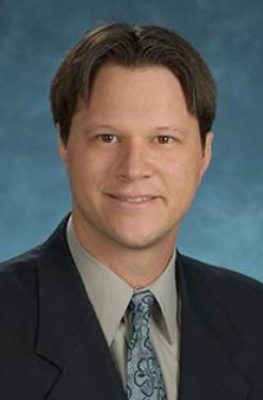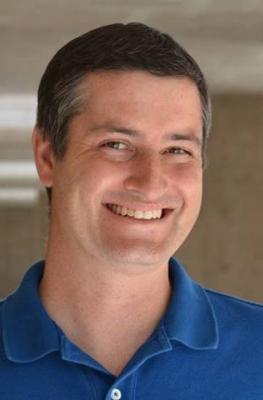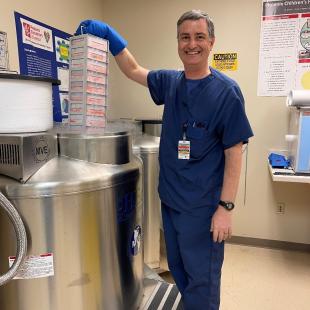We are changing the landscape of healthcare every day.
Each month, Phoenix Children’s Research spotlights leading physicians and other clinical leaders for their work in the areas of Research, Education and/or Advocacy. For the month of April, we are spotlighting Kaleo C. Ede, MD, for his work in the field of Research and Matthew T. Pankratz, PhD, for his contributions to Education.

Kaleo C. Ede, MD
Kaleo C. Ede, MD, is a pediatric rheumatologist and has been on staff at Phoenix Children’s since 2008. He serves as Director of Rheumatology Research and Quality Improvement at Phoenix Children’s. In addition, Dr. Ede is Clinical Associate Professor of Clinical Pediatrics at the University of Arizona College of Medicine – Phoenix and Assistant Clinical Professor of Pediatrics at Creighton University School of Medicine. Dr. Ede is board certified in pediatric rheumatology.
Born and raised in Honolulu, Dr. Ede earned his medical degree at University of Hawaii, completing his residency at Phoenix Children’s and Banner Good Samaritan Medical Center. Dr. Ede then went on to complete his fellowship training at the David Geffen School of Medicine at UCLA.
Dr. Ede’s initial career aspirations were to pursue primary care but through several patient experiences, he fell in love with pediatric rheumatology.
Believing education is a key aspect of caring for patients with pediatric rheumatic diseases, Dr. Ede and the Division of Rheumatology staff train medical students, resident physicians and adult rheumatology fellows so other physicians are aware of how to recognize children with rheumatic diseases. Dr. Ede is currently enrolled in the Phoenix Children’s/Arizona State University Quality Improvement and Healthcare Leadership program to learn new techniques to help improve the delivery of care to our patients at Phoenix Children’s.
Dr. Ede has been regularly named one of PHOENIX magazine’s Top Doctors in Rheumatology. He is a longtime volunteer for the Arizona chapter of the Arthritis Foundation and served as the Board Chair of the Arthritis Foundation from 2012-2015. Since 2015 Dr. Ede has served as a volunteer physician at the St. Vincent de Paul clinic, where he provides free medical care to patients with no health insurance.
Dr. Ede has three children, ages 16, 14 and 12. All three play sports, so he stays busy keeping up with them. He enjoys most watersports, specifically water polo and surfing, and visits his parents in Hawaii as often as he can. Dr. Ede’s favorite movie quote is from a documentary called “Jiro Dreams of Sushi” – “Once you decide on your occupation.. you must immerse yourself in your work. You have to fall in love with your work. Never complain about your job. You must dedicate your life to mastering your skill. That's the secret of success ..and is the key to being regarded honorably.”
More About Dr. Ede’s Research
Dr. Ede performs cutting-edge research with the goal of providing early diagnosis and tracking treatment outcomes to improve the care of children with rheumatic disease. His interest in research comes directly from his desire to provide better care for the patients he sees in clinic every day.
As the first member of the Rheumatology Division to receive a Leadership Circle grant, Dr. Ede collaborates with our Ophthalmology colleagues on his research project, “Preventing Blindness in Children with Juvenile Arthritis.”
Dr. Ede is also the principal investigator for two ongoing studies in the Childhood Arthritis and Rheumatology Research Alliance Registry trial and an investigator-initiated study of the use of laser flare photometry to diagnose uveitis in children with juvenile arthritis.
In partnership with Phoenix Children’s Information Technology department, Dr. Ede has led the development of a clinical dashboard to track the disease activity and rates of remission in our childhood systemic lupus erythematosus patients.
Dr. Ede’s thoughts on research involvement – “Research is vital for a specialty like pediatric rheumatology. Children with rare diseases need ongoing research to develop new treatments and better ways to diagnose and care for them. It is important for students who have an interest in pediatric rheumatology to be excited about research opportunities as well.”
Dr. Ede is a fellow of the American College of Rheumatology and the American Academy of Pediatrics, and a member of the Childhood Arthritis and Rheumatology Research Alliance and the Pediatric Rheumatology Collaborative Study Group.
“It has been a pleasure watching Dr. Ede first join the Division of Rheumatology in 2008 as a new fellow graduate and blossom into a superb clinician, leader within the division and hospital, and more recently expanding his research interests and endeavors, including winning the coveted Phoenix Children’s leadership grant and becoming the Director of Research for our division. I am excited to work with Dr. Ede on his multiple research endeavors in 2022 and beyond, and we are lucky to have him here at Phoenix Children's.” – Michael Shishov, MD, MPH, Division Chief of Pediatric Rheumatology at Phoenix Children's
Dr. Ede’s Research Publications
- Preliminary evidence on abatacept safety and efficacy in refractory juvenile localized scleroderma
- Serologic and Cytokine Signatures in Children With Multisystem Inflammatory Syndrome and Coronavirus Disease 2019
- Distinguishing Multisystem Inflammatory Syndrome in Children From COVID-19, Kawasaki Disease and Toxic Shock Syndrome

Matthew T. Pankratz, PhD
Matthew T. Pankratz, PhD, is the Supervisor for Phoenix Children’s Biorepository, where biological specimens are held for future research. Enthusiasm, collaboration, biobanking experience, diagnostic information and data are all tools Dr. Pankratz uses to improve human health through research.
Dr. Pankratz earned his bachelor’s degree in zoology and psychology at the University of Wisconsin-Madison, where he stayed to pursue a doctorate in neuroscience, because of a unique opportunity to be one of the first researchers to work with human embryonic stem cells. During his doctorate, Dr. Pankratz helped develop protocols to coax stem cells to develop into neurons, including motor neurons and retinal cells, which are now part of clinical trials. He did his post doctorate at the prestigious Salk Institute in La Jolla, California, where he created cell and mouse models for neurodegeneration and injury – including spinal muscle atrophy and spinal cord injury for the Christopher & Dana Reeve Foundation. In 2019, he moved to Phoenix to be closer to family at Phoenix Children’s.
During his initial tenure at Phoenix Children’s, Dr. Pankratz worked with the Anesthesia Pain Management research team, where he received important training for human subjects research and clinical experience in the operating room to see how clinical samples are collected.
Throughout his academic training and work in biotech, Dr. Pankratz saw the importance of sharing cell lines, pieces of DNA and data that enable and accelerate research. Time spent working in the lab helped him learn techniques for analyzing samples with cell culture, sequencing and molecular biology, while exposing him to the development of experimental designs, grants and publications. By running the biorepository, Dr. Pankratz can contribute to a wider range of research than he did in an academic setting, where he focused on early neurodevelopment.
Dr. Pankratz quoted Isaac Newton, “If I have seen further, it is by standing on the shoulders of giants” because it speaks to how science works – by building off ideas and techniques created by others. His goal is to bridge generous patients and families giving biological material to doctors and scientists who need samples to research diseases and treatments. A key part of Dr. Pankratz’ s role in the biorepository is to serve as an intermediary and liaison to protect patient rights and confidentiality. Dr. Pankratz’s role is unique in that he has the opportunity to facilitate research, education and advocacy with each patient.
When Dr. Pankratz is not in the laboratory, you might find him playing badminton...poorly (a shift from his days of Ultimate Frisbee in college), cheering for the Packers or entertaining his two cats – Macintosh and Fritter (AKA, Apple Fritter).
More About the Biorepository

When Dr. Pankratz partners with our physicians and scientists to conduct research, the team advocates for patients. When patients participate in research, they are helping our doctors and scientists generate a better understanding of diseases, develop new tests and medicines, evaluate new medications, look for new genes that may cause cancer or developmental delays, and identify new pathogens. By working with the wide range of patients seen at Phoenix Children's today, Dr. Pankratz believes this is one of the best ways of improving the health of all the children we care for in the future.
Working in a biorepository is great because of the diversity of research available. From genetics, neurology, oncology and infectious disease to new tests and medications, all of these rely on biological specimens collected and stored in the biorepository. The COVID-19 pandemic has been a recent example of the importance of biorepositories, which are necessary for tracking the emergence of new variants and looking back at viral origins. Dr. Pankratz is working with Arizona Department of Health Services to look for new strains of SARS-CoV-2, the virus behind COVID-19.
This year, Dr. Pankratz is also leading a team to create an electronic consent that will allow all patients visiting Phoenix Children's a streamlined opportunity to participate in the biorepository and donate samples for research after clinical testing is complete. “We can’t save every sample, but we hope to expand our current collection of 20,000 samples to cover as many of the patients we care for as possible,” Dr. Pankratz said. “We want the repository to be a nationally recognized collection of pediatric samples used by Phoenix Children's doctors, scientists and collaborators to discover new diseases, tests and treatments.”
“We are incredibly fortunate, here at Phoenix Children’s, to have the biorepository as a resource that encourages clinical innovation and helps us learn from every patient. We are even more fortunate to have a top-tier scientist like Dr. Pankratz leading this crucial program.” – Michael C. Kruer, MD
Dr. Pankratz’s Research Publications
- Mapping the Effects of Genetic Variation on Chromatin State and Gene Expression Reveals Loci That Control Ground State Pluripotency. Cell Stem Cell
- Speed and segmentation control mechanisms characterized in rhythmically active circuits created from spinal neurons produced from genetically-tagged embryonic stem cells
- Loss of motoneuron-specific microRNA-218 causes systemic neuromuscular failure
